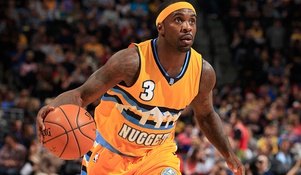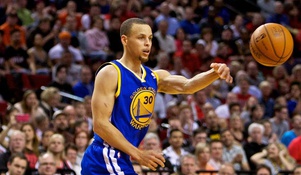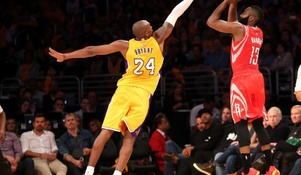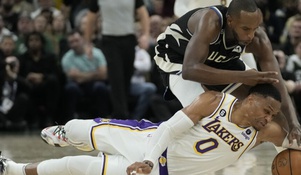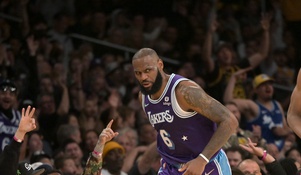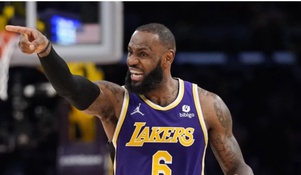The Career of Kobe Bryant
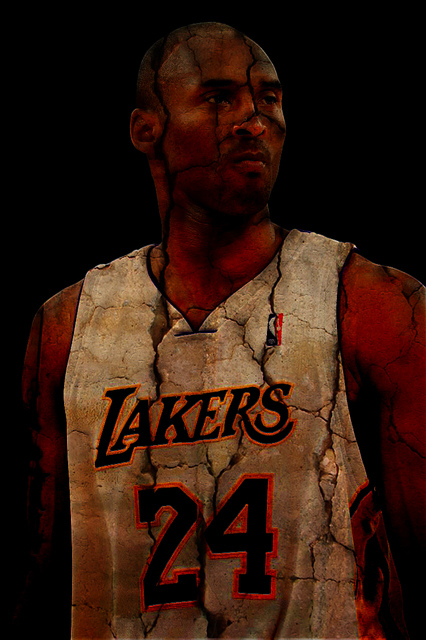
DISCLAIMER: This post will have less snark, sarcasm, and corny jokes than usual, but I promise to be extra snarky, sarcastic, and corny in my next post to make up for it. You're welcome.
Growing up, Michael Jordan was my favorite player. He was the best, and everyone knew it. Teammates knew it, opposing players knew it, coaches knew it, fans knew it, announcers knew it, literally everyone knew it. It seemed as if he was invincible, that no one could touch him on a basketball court, but, as the saying goes, Father Time is undefeated; and No. 23 eventually had to hang up his Air Jordans (and then take 'em down again, and then hang them up again, but we're going to pretend that those Wizards years never happened).
It was 1998, and I was looking for someone to fill the favorite player spot that Jordan was just about to vacate. I didn't know who Kobe Bryant was when he was in high school, nor did I take much notice of him during his rookie season (he didn't play much that year, anyway), but all the talking heads kept comparing him to Michael Jordan, and I figured there was no one better to take over as my favorite player than the so-called "next Michael Jordan". The Lakers were Shaq's team, but it was clear that this Kobe Bryant kid was coming, so I made sure to watch every Lakers game I could, and somehow No. 8 always seemed to stand out.
My father took me to a preseason Lakers game for my 13th birthday, down in Little Rock, Arkansas. Living in Kentucky, there weren't a ton of options to go see NBA games in person, and the Lakers were going to Arkansas around my birthday (becuase that was Derek Fisher's hometown), so we went down for a long weekend, with the Lakers game being the highlight. Shaq didn't play in that game, but Kobe did, and he put on a show. After following Bryant for all these years, it became clear to me why he plays through injuries, why he plays when he's sick, and why he plays in meaningless games in Little Rock, Arkansas: so that people like me, who only get one chance to see him in person, remember that moment for the rest of their lives.
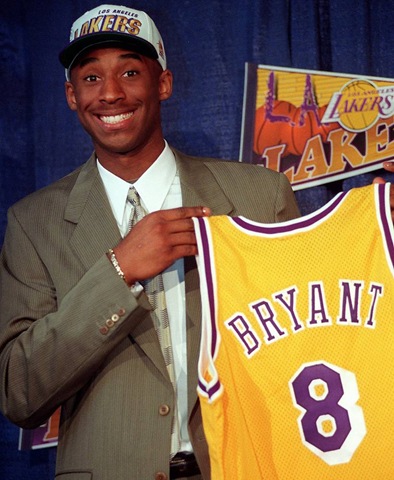
Bryant started his NBA journey as a stick-thin teenager, drafted straight out of high school (which was an extremely rare occurence back then). Jerry West, a great player, who also became a great executive, saw the potential in this stick-thin teenager, so he traded Vlade Divac to bring the kid to L.A. Bryant wasn't thrown into the fire immediately, he only played 15 minutes per game his rookie year, and only 26 minutes per game the year after that, but there were signs that the hype around Bryant was real. He was confident, fearless, and an incredible athlete, who became a fan favorite almost instantly because of his acrobatic dunks (even being named an All-Star in 1998 without being a starter on the Lakers). The 98-99 season is when Bryant became a full-time starter, and the potential for not only greatness, but legendary status, became noticeable.
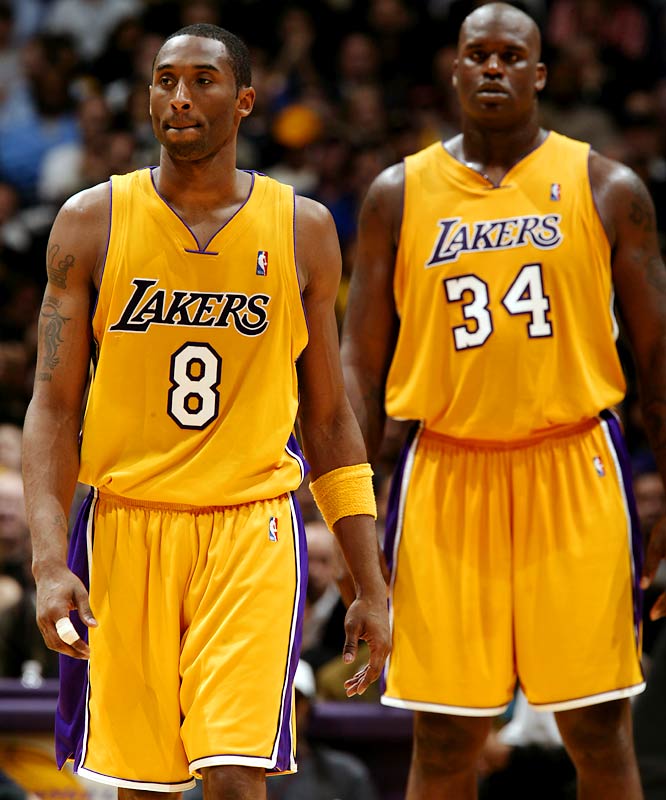
Shaquille O'Neal and Kobe Bryant became the most devastating one-two punch in the league, and possibly in history. From 1998 - 2004, the duo dominated the league, including putting together one of the most memorable championship runs in NBA history in 2001, losing only one playoff game along the way (when Allen Iverson's cornrows embarrassed Tyronn Lue's cornrows in game 1 of the Finals). Bryant had earned clutch performer status the year before, when he stepped up in the Finals after O'Neal fouled out and calmly led the Lakers to victory while assuring his teammates that he's not going to let them lose.
Bryant earned a reputation as one of the hardest workers in the league, always looking for ways to enhance his game or improve his footwork. There are hundreds of stories from teammates, coaches, and trainers about his work ethic, but one that sticks out for me was from the trainer for the Olympic team. You can read the full story, here, but I'll give a quick overview for those of you who don't like clicking on words that are a different color than the rest of the words. Bryant called the trainer around 3:30 in the morning, asking if he wouldn't mind coming down to the gym to help him get some conditioning work in. The trainer says sure thing and meets him there around 4:30. Kobe is already drenched in sweat, and they work for two hours on conditioning and weight lifting. They say their good-byes and the trainer heads back to his room. The trainer comes back to the gym around 11 the next morning for practice and sees Kobe getting shots up on one of the side goals. He goes over and asks him what time he finished his work out and Kobe responds with "Just now, I wanted to make 800 shots". Bryant was blessed with incredible talent, but even more incredible is his work ethic, when you read about these kinds of stories you really understand what makes Kobe one of the greats of the game.
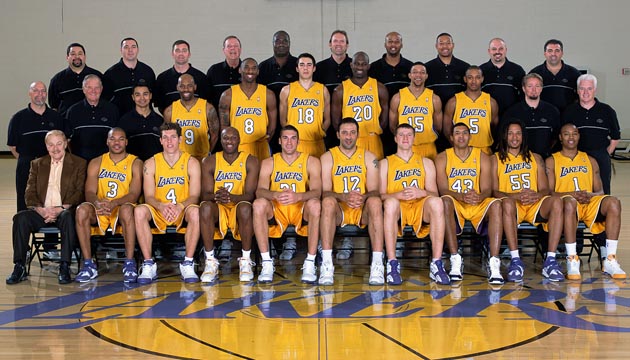
Unfortunately, this manic work ethic also makes Kobe hard to deal with as a teammate, and it was a part of the reason Shaquille O'Neal got traded from L.A., breaking up one of the most dominant tandems in NBA history. The Lakers chose to build around Kobe, and began shipping out all the aging pieces from the championship teams of the past. It became the Kobe Bryant show in Lakerland, there were no other stars on the team anymore, however, there also wasn't much talent on the team anymore. Look at that team picture above, how many faces do you recognize? Kobe Bryant and Lamar Odom, I'm sure. Probably Caron Butler down there on the right, too (pre-stupid three point celebration days). How many of these guys had meaningful NBA careers? Bryant, Odom, and Butler. That's it. And it explains why those few years after Shaq left were down years. Even so, Kobe made each game interesting, and the Lakers won more games than they should have on paper. These felt like Kobe's peak years, he was throwing up huge numbers, but it all seemed to be in vain. From 2005 - 2007, Bryant averaged 31.5 points, 5.6 rebounds, and 5.3 assists per game. He played the game like no other superstar could during this time. He won games single-handedly, he scored the second most points in NBA history when he dropped 81 on the Toronto Raptors, and (perhaps even more spectacular than scoring 81 points) he even outscored the Dallas Mavericks by himself through three quarters (62 for Kobe, 61 for Dallas) before electing to sit out the fourth (keep in mind, this is the Dallas team that made it to the NBA Finals and nearly won the championship until the referees, er, Dwyane Wade, took over). He took the Lakers to the playoffs in 2006 and 2007, despite the lack of talent on those teams. They even took the second seeded Phoenix Suns to seven games in 2006, but they couldn't get out of the first round. Bryant began demanding the Lakers make trades to bring in more talent around him, and they eventually struck gold in 2008.
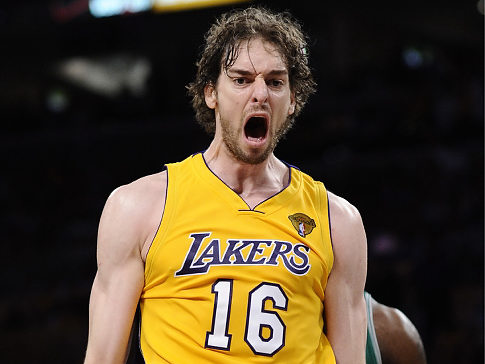
The Lakers traded for Pau Gasol in 2008, giving up basically the rights to Marc Gasol and two first-round picks. The deal was widely ridiculed at the time, Pau was a bonafide star on his Grizzlies team, and Marc was a complete unknown. It looked like the Grizzlies just gave Pau Gasol to the Lakers. The trade doesn't seem nearly as lopsided now, with the incredible develoment of Marc Gasol into an All-star and Defensive Player of the Year winner, and the enormous value placed on first-round picks in today's game, but that's a different discussion for a different day. Gasol's sky high basketball IQ made him the perfect sidekick to Kobe Bryant. Gasol and Bryant developed great chemistry, and throughout Gasol's tenure with the Lakers and seemingly constant trade rumors, Bryant was always Gasol's biggest defender. The Lakers became a great team once again, with Bryant finally winning league MVP, and he and Gasol led the Lakers to the Finals in 2008, where they came up against their historic rivals and newly formed "big three" (Paul Pierce, Ray Allen, and Kevin Garnett), the Boston Celtics. The Celtics won that series in six games, but the Lakers would get their revenge two years later.
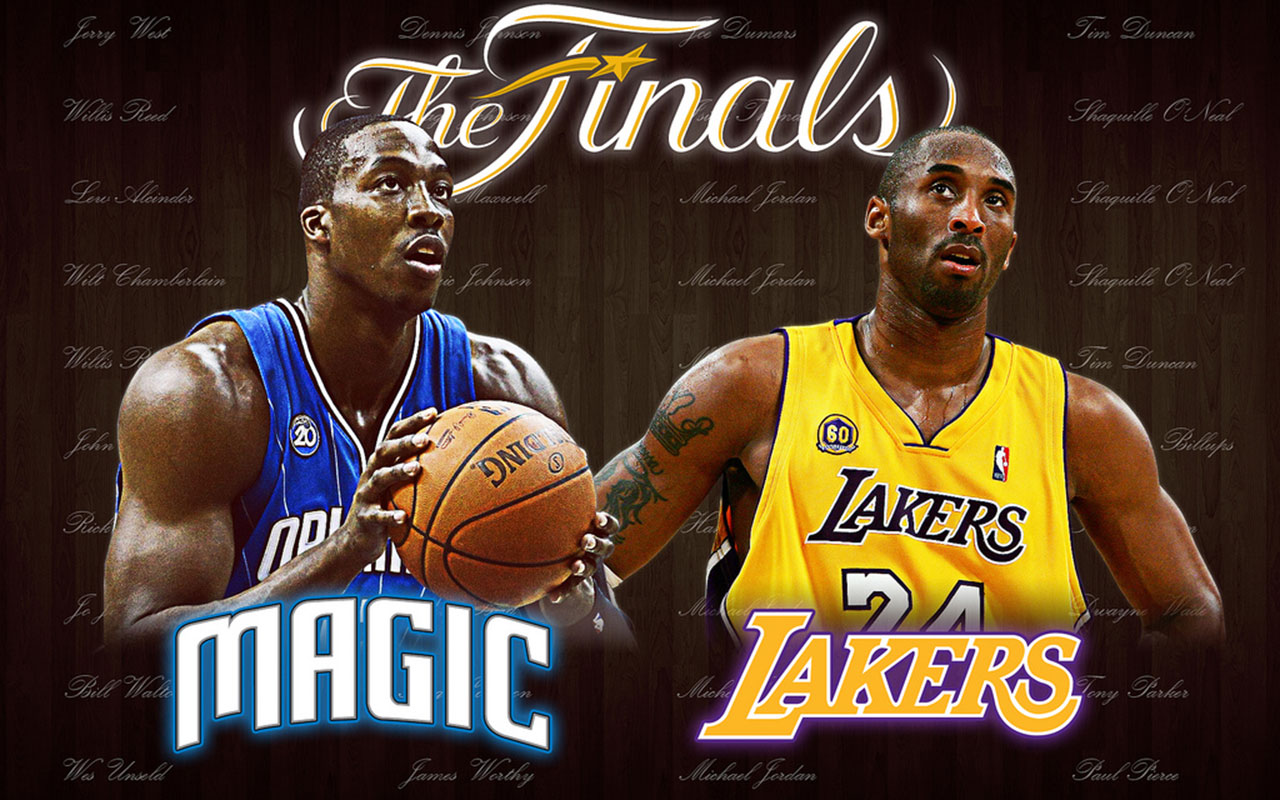
Kobe again took the Lakers to the Finals in 2009, where he looked like a man on a mission. There were countless scowls, incredible shots, and a realization that Bryant wanted to win that championship more than anyone else. He averaged 32.4 points, 5.6 rebounds, and 7.4 assists in that five game series, and Bryant got to hoist the Larry O'Brien trophy for the fourth time. The Lakers made it back to the Finals for a third consecutive season in 2010, where they again met the Boston Celtics. The core of each team was realtively unchanged, but this time the Lakers took the championship. It was a back-and-forth seven game series, with Kobe struggling through much of game 7, before settling down and helping close out the Celtics in the fourth quarter. He averaged 28.6 points, 8 rebounds, and 3.9 assists per game in that series. He was awarded the Bill Russell Finals MVP trophy for the second time, and the Larry O'Brien trophy for the fifth time.
The Lakers were championship contenders again the following year, but were eliminated in the second round by the eventual champion Dallas Mavericks. Bryant kept putting up numbers, making All-star teams and All-NBA teams, and leading the Lakers to the playoffs each year, but it looked like their championship window had shut. Then the Lakers did a very Lakers-y thing: They traded for Dwight Howard and Steve Nash, two pieces that should have put the Lakers right back in contention.
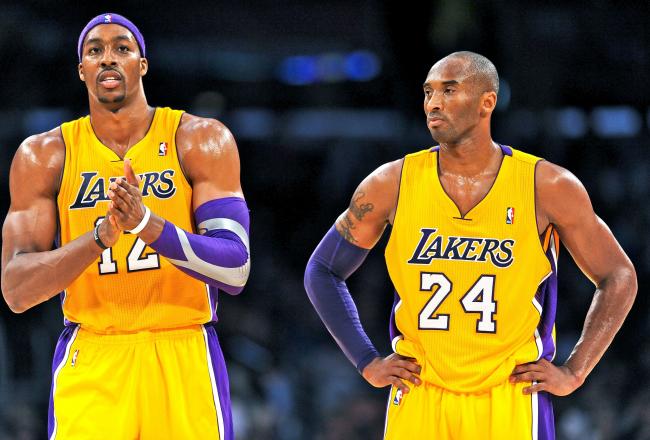
Like Kobe Bryant, Dwight Howard also had a reputation; unlike Kobe Bryant, Dwight Howard's reputation was as a goofball. Howard was known as a jokester who didn't take the game seriously. Everyone knew that Bryant and Howard wouldn't mesh, but the Lakers hoped that Bryant's personality would get Howard to buckle down and look at basketball as a career instead of as a game. It never clicked. Howard resented Bryant for trying to tell him what to do and not ceding control of the franchise to him. Bryant resented Howard for not taking basketball seriously and for wanting to be "the man" without earning it first. Steve Nash couldn't stay healthy and hardly ever played for the Lakers, and a team that looked like a title favorite before the season began was now struggling to even make the playoffs as the season wound down.
Yet through this turmoil, Kobe found a way to give the Lakers fans something to cheer for. The Lakers were a fringe playoff team with the season coming to a close. They were playing the Hornets, a team the Lakers should blow out on paper, but as the game wore on, the Hornets just kept extending their lead. The Hornets' lead was 21 near the end of the third quarter, and it looked like the Lakers were going to suffer another defeat, pushing them below .500. The Lakers went on to outscore the Hornets 33-9 in that fourth quarter, with Bryant scoring 13 in the final 6 minutes. He finished with 42 points, 7 rebounds, 12 assists, and a victory.
Two nights later, a similar story unfolded. The Lakers again trailed by double digits, this time at home, and this time to the Toronto Raptors. Bryant had another big fourth quarter, but unlike the New Orleans game, the Lakers couldn't stop the Raptors, so they needed threes, and lots of them, to make their comeback. Bryant hit three threes in the final 1:45, including the tying three with five seconds left. Bryant went on to give the Lakers the lead for good with 10 seconds left in overtime.
Despite his age and the poor chemistry on that team, Kobe gave everthing he had to try to pull the Lakers into the playoffs. And he succeeded, but not without a cost. A month after the Raptors game, with only a few games remaining in the season, Bryant tore his Achilles in a game against the Warriors. He was obviously done for the rest of the year, and whatever chance the Lakers had to make noise in the playoffs was gone.
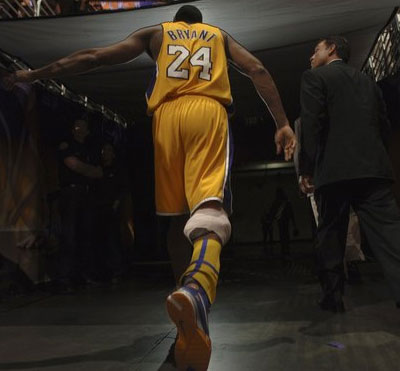
Howard moved on to Houston, Gasol moved on to Chicago, and Nash moved on to retirement. But Bryant remains. He's not the player he was in his prime, he's not the player he was before the Achilles injury, his body is betraying him. The injuries he once played through now keep him out for weeks. He hasn't been able to finish a season since 2012. His greatness is starting to be forgotten. Which is why I wrote this piece. When Bryant eventually retires in the not too distant future, experts and analysts will dissect the career of Kobe Bryant; they'll list his greatest moments, they'll show us footage from his most spectacular games, they'll rank him as one of the best players to ever live, and they'll remind us how truly great he was. But I've never forgotten.
Say what you will about him. About his ego, about his personality, about his attitude. But love him or hate him, he left it all on the court for you. Because you needed something to love. Or you needed something to hate. He gave you moments to reminisce about if you were a fan, he gave you moments to lament if you weren't. He gave you reasons to love him, and he gave you reasons to hate him. He made you care, because he was that good.
There's a reason the greatest players ever identify with Kobe Bryant, from Larry Bird to Michael Jordan; they see the same desire in him, the same work ethic, the same determination, the same fight. He may not be the greatest basketball player ever, but he did something few athletes in the history of the world have ever done: he reached his full potential. And like many of those athletes, he believes he can still be his best, even when his body is telling the world something different. Kobe Bryant has one year left on his contract, and then rumor has it that he'll retire, but you know that for that one year he's going to give it everything he has. Nothing held back. Once more into the fray.
"Once more into the Fray...
Into the last good fight I'll ever know.
Live and die on this day...
Live and die on this day... "
-Jon Treloar

